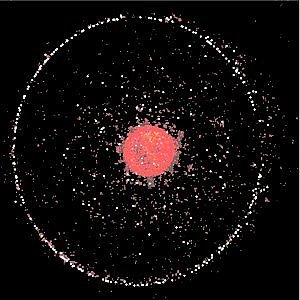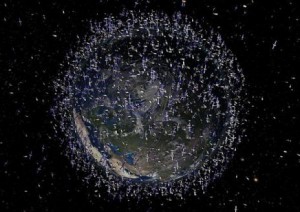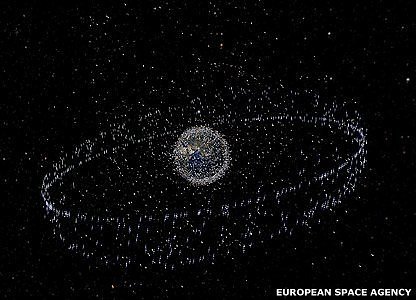Where Do Satellites go when they die? -Another Dead Satellite to Fall This Weekend
Dead Satellites are being ‘unwelcome guests’ recently. The 6-ton Upper Atmosphere Research Satellite (UARS) satellite has entered the Earth’s atmosphere early morning of September 24th 2011, but where it has crashed remains unknown. According to NASA, debris would likely have fallen in Ocean, and it may never be found.
Usually satellites’ lifespan depends on their sizes; life span is determined by how much liquid fuel they carry aboard. A satellite that has exceeded its useful purpose has several final resting places. These depend on the amount of fuel available on the satellite, and whether ground control is still able to manoeuvre it. One method is to move the satellite into a ‘graveyard orbit’ (geostationary orbit), which is higher in orbital band and no other satellites are orbiting. Dying satellite can be left to degrade over time, but as it breaks up and potentially shifts in orbit, this could still prove dangerous to other satellites.

European Space Agency: Red dots= debris, White dots= operating satellites, Outer ring= satellites in geostationary orbit
Some satellites are merely left in their current orbits if uncontrollable. Other satellites are purposely moved lower into the atmosphere so they burn up and hopefully disintegrate before reaching the Earth. While this is usually the case there have been some notable exceptions, including NASA’s Skylab station in 1979, NASA’s UARS and ROSAT as mentioned earlier.
According to the Federal Communications Commission, any satellite with altitude in geostationary orbit, meaning that satellites just below 36,000 km, must be moved farther away from the Earth at the end of its useful life.
Satellites fall because of frictions and resistance of the atmosphere. In theory, if satellites’ centrifugal force and the Earth’s gravity balance, satellites can circulate the orbit without falling. Scientists probably have worked on different calculations on how satellites work; however, such recent events may appear as lack of preparation and carefulness. There are no clear back-up plans suggested if their expectations are not met. Our lives certainly have become more convenient with satellites, but if what we sent out in the past can come back to hurt us, how meaningful are those techniques? We have to look out for the safety of satellites rigorously.
Not only that, there is a real danger. Concerning that we are sending the dead satellites to outer orbit and keep sending new satellites without proper disposal methods, our planet is turning into the largest dumping ground. Is this what you expect our planet to look like? Would this be what aliens expect the earth to be? They will have problems figuring out whether this Saturn-like planet is the earth!



October 21st, 2011 at 2:21 pm
I did not know this was a problem. I really thought that they either just burned up as they entered our atmosphere or just stayed out there forever. I didn’t know it could hit someone!
Although, I have to be honest; that would be a cool way to go…
October 21st, 2011 at 8:10 pm
I knew about working satellites potentially colliding with all the space junk out there and affecting communications here on Earth, but I didn’t know how common it was for the junk to make it through the atmosphere and hit the surface. Or, is it being played up more than is warranted by the actual risk of this happening?
October 23rd, 2011 at 3:34 am
Christina,
Yes I thought they would remote control and bring it down safely to the ground and dispose it. I was quite surprised by that they calculate to burn them, or leave them in the Space. We are putting garbage out there…
Eric,
From what I have read, when satellite falls out of orbit, about 10~40% of its mass survives re-entry. Hundreds of objects do hit the surface of the Earth each year, but they have been random enough to avoid hitting or injuring anyone(as there were no reports yet). I heard of this falling debris just because there has been issues going on recently. (The more your country is targeted, the more concerns rise). Not sure if it answers your question.
October 24th, 2011 at 1:59 pm
Have you come across any statistics of how many people or structures have been hit by crashed satellites. I wouldn’t have thought this to be a very big deal, sort of like a chance of getting struck by lightening kind of incident. Also, I was a bit confused about your statement “we are sending the dead satellites to outer orbit”. Does that mean we have gotten them back to Earth and then relaunched them back into space to be disposed of? It was an interesting article to read. Thanks for the post.
October 24th, 2011 at 4:22 pm
I recall watching my daily dose of Colbert Report a few weeks back, and the subject of the recent satellite re-entry came up.
Here’s a link:
http://gawker.com/5843182/stephen-colbert-mocks-nasas-useless-satellite-projections
It seems NASA’s prediction on satellite crashes aren’t too accurate. Would there be a way to plan out where a satellite will crash prior to landing? Or would the length of time it spends orbiting the earth be open to too much interference? I had previously heard that most re-entering satellites ended up in the ocean.
October 28th, 2011 at 12:17 pm
Monica,
No, I think they send the dead ones outer orbit because if we can bring down, they would rather do that. I guess bringing back is harder or more energy consuming than just sending them further in orbit. And it is right that it’s a rare event like being hit by lightening.
Kenny,
I am not too sure about how accurate and what their plans are. That was one of the reason why I thought they are somewhat being irresponsible. And yes, as mentioned, no one got hit so far, and most of debris end up in the ocean.